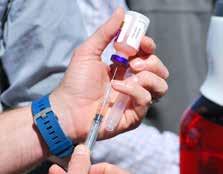SPECIAL ADVERTISING SECTION
Immunologist THE
ASK
Ask the Immunologist is a new column featuring expert answers and sponsored by Merck Animal Health.
Why are some horses more reactive to vaccines than others, and what’s the best way to prepare clients for what to expect after their horse is vaccinated?
Courtesy Merck Animal Health
W
hen it comes to vaccination, communication is key to reinforcing this critical service with clients who are bombarded with consumer opinions and online information. Help clients keep perspective by reminding them that, while vaccination comes with inherent risks—as do all medical procedures—the overall incidence of vaccine-associated adverse events (VAAEs) is very low. Bolster clients’ vaccination knowledge—and confidence—by taking them through a three-part conversation.
of how vaccines affect the equine immune system. Stick to the basics of natural (innate) and adaptive (acquired) immunity, focusing on the differences between killed and modified-live vaccines. The primary message is that each type of vaccine stimulates the immune system differently.
response to a vaccine. This is what makes it so difficult to identify horses predisposed to allergic reactions and is why VAAEs are not generally due to a faulty product. What’s more, environment may play a role in VAAEs, making it difficult to predict reactions without a previous or repeated episode. Caution must be exercised when vaccinating any horse previously reported to have had a VAAE, especially if the clinical signs suggested an allergic type of vaccine reaction.
PART 2: EMPHASIZE CUSTOM PROTOCOLS. Make sure clients understand the
PART 3: ACKNOWLEDGE POTENTIAL VAAES. VAAEs can vary in type and sever-
PART 1: EXPLAIN HORSES’ IMMUNE RESPONSE. Give clients a quick rundown
American Association of Equine Practitioners’ core and risk-based vaccination guidelines are taken into consideration along with your personal experience with the horse, including the individual’s age, medical conditions, lifestyle and history of VAAEs. Just as some people are allergic to certain medications or foods, vaccine reactions in horses may be based upon their unique immunological makeup and
ity, and horses rarely experience severe reactions. For perspective, let clients know that most reactions are similar to what a person might experience after a flu shot. Still, make sure clients understand these three types of VAAEs, and remind them it’s best for the veterinarian to administer vaccinations so you’re present if a VAAE occurs. • Local injection site reactions. By far the
ABOUT THE AUTHOR Duane E. Chappell, DVM, Associate Director, Equine Pharmacovigilance and Professional Services at Merck Animal Health, has a background in academia, equine research and private practice. Dr. Chappell and the pharmacovigilance team answer calls daily from veterinarians on immunology and questions associated with Merck Animal Health products, including potential VAAEs. SPONSORED BY MERCK ANIMAL HEALTH
most common type of VAAE. Usually occur within 24 hours of vaccination and resolve shortly thereafter. Signs include: • Localized swelling of varying degree, injection-site tenderness, muscle soreness • Decreased range of motion of the limb or head and neck less commonly • Abscesses on very rare occasions • Mild systemic reactions. Usually resolve within 24 to 48 hours without treatment. Signs include: • Low grade fever (less than 102°F), lethargy, lack of appetite • Allergic systemic reactions. Require veterinary attention. Signs include: • Sweating, elevated heart rate, respiratory distress, colic or hives • Anaphylaxis, extremely rare and most severe VAAE Setting realistic expectations with clients about what to expect after vaccinations, including potential VAAEs, goes a long way to easing their minds, building a strong relationship and reinforcing your credibility along with the importance of veterinarian-administered vaccines. By working together, you and your clients form a formidable team in keeping horses protected against disease.
WANT TO ASK A QUESTION? EMAIL THE EDITOR. For more immunology-related information, visit merck-animal-health-usa.com/species/equine
ModernEquineVet.com | Issue 4/2020
7



